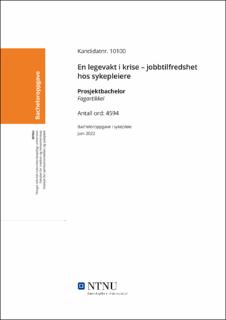| dc.contributor.advisor | André, Beate | |
| dc.contributor.author | Nørsett, Silje | |
| dc.date.accessioned | 2022-07-19T17:21:11Z | |
| dc.date.available | 2022-07-19T17:21:11Z | |
| dc.date.issued | 2022 | |
| dc.identifier | no.ntnu:inspera:110921428:52385491 | |
| dc.identifier.uri | https://hdl.handle.net/11250/3006969 | |
| dc.description.abstract | Bakgrunn:
Fastlegekrise, og andre årsaker som koronaepidemi og økende gjennomsnittsalder i befolkningen, har bidratt til en økning i pasientpågangen til legevakt. Dette har forårsaket en endring i sammensetningen av pasientene som oppsøker legevakt, samtidig som ventetiden for pasientene har økt. Denne studien har som hensikt å se på hvordan sykepleierne på en interkommunal legevakt påvirkes av disse endringene, da spesielt med tanke på jobbtilfredshet.
Metode:
Kvalitativ studie basert på semistrukturerte dybdeintervju av syv sykepleiere ansatt på en interkommunal legevakt. Datamaterialet ble analysert etter inspirasjon av metoden systematisk tekstkondensering.
Resultat:
Påvirkningen av sykepleiernes jobbtilfredshet ble delt inn i tre hovedkategorier: (1) psykososialt arbeidsmiljø, (2) organisering og ledelse, og (3) følelse av avmakt. Subkategoriene går videre inn på tema som motivasjon, driftsproblematikk, og sykepleiernes relasjoner til ledelsen, hverandre, og til pasientene.
Konklusjon:
Denne studien fant sterke indikasjoner på at fastlegekrisen og økt pasientpågang har forårsaket en reduksjon i sykepleiernes jobbtilfredshet. Med demotiverte arbeidstakere, suboptimal drift av legevakt, og et truet arbeids- og samarbeidsmiljø, risikerer organisasjonen at mange sykepleiere avslutter arbeidsforholdet. Dette kan gå ut over pasientsikkerhet og pasienttilfredshet, og legevakta vil kunne tape opparbeidet erfaringskunnskap, og få mindre resiliente arbeidstakere.
Nøkkelord: jobbtilfredshet, trivsel, legevakt, sykepleier | |
| dc.description.abstract | Background:
The GP-crisis, along with causes such as the covid-19 epidemic and an ageing population, have contributed to an increase in patient attendance to the Norwegian emergency primary health care clinics. This has caused a change in the composition of patients who seek these clinics, along with a simultaneous rise in patient wait time. This study aims to look at how these changes affect the nurses in an inter-municipal emergency primary health care clinic, in particular with regard to job satisfaction.
Method:
A qualitative study based on semi-structured in-depth interviews of seven nurses employed in an inter-municipal emergency primary health care clinic in Norway. The data analysis took inspiration from the method of systematic text condensation.
Results:
The impact on the nurses' job satisfaction was divided into three main categories: (1) psychosocial work environment, (2) organisation and management, and (3) a feeling of debilitation. The subcategories delve deeper into topics such as motivation, operational issues, and the nurses' relations to management, each other, and to the patients.
Conclusion:
This study found strong indications of a reduction in job satisfaction among the nurses due to the GP-crisis and increased patient attendance. With demotivated employees, suboptimal operation of the emergency primary health care clinic, and a threatened work and collaboration environment, the organisation risks an increase in employee resignation among the nurses. Possible consequences include a less resilient workforce, a loss in accumulated experience-based knowledge, and a negative effect on patient safety and satisfaction.
Key words: job satisfaction, emergency primary health care, out-of-hours primary care, nurses | |
| dc.language | nob | |
| dc.publisher | NTNU | |
| dc.title | En legevakt i krise – jobbtilfredshet hos sykepleiere | |
| dc.type | Bachelor thesis | |
